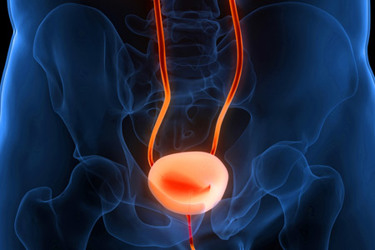A Perfect Pair? Combining Keytruda And mRNA Therapy To Optimize Bladder Cancer Outcomes
A conversation with Guru Sonpavde, MD, medical director of genitourinary oncology, assistant director of the clinical research unit, AdventHealth Cancer Institute

Timing is of the essence. And the truism couldn’t be more pertinent to the work of Guru Sonpavde, MD. Heading Merck’s INTerpath-005 Phase 2 trial for muscle-invasive urothelial carcinoma, a type of cancer found in the bladder or upper urinary tract, Sonpavde prioritizes quick identification and enrollment of patients to meet the eight-week post-operative window dictated by the trial’s inclusion/exclusion criteria.
The INTerpath-005 trial is a 200-patient randomized Phase 2 trial for combination therapy of pembrolizumab (KEYTRUDA) and V940, an investigational mRNA-based individualized neoantigen therapy targeting tumor-specific antigen, for patients with muscle-invasive urothelial carcinoma who’ve had their bladder or upper urinary tract removed. Because these patients have microscopic metastasis that can grow in time, the trial delivers postoperative adjuvant immunotherapy — KEYTRUDA, which is very similar to the already FDA-approved nivolumab (OPDIVO) and has been shown to improve outcomes in a Phase 3 trial — to all patients, and half of the patients will also receive the V940 mRNA immunotherapy.
V940 targets the new antigens (proteins) based on the mutations found specifically in the patient’s cancer that are defined by testing the tumor cancer biopsy specimen and the patient's blood sample. Based on bioinformatics computation assays, scientists identify up to 34 new proteins based on mutations found only in the cancer. This customized mRNA therapy exemplifies precision medicine and is anticipated to boost the immune system against these proteins.
Given the site at AdventHealth in Orlando was the first in the U.S. and the only one in Florida, this is a prominent clinical trial for this major institution. Yet, Sonpavde takes it in stride. In this interview, Sonpavde credits the patient-centric trial design, the city’s diversity, and the staff’s expertise with executing the trial for giving bladder cancer patients a chance at a quicker and fuller recovery.
Clinical Leader: Reflecting on this trial, what are the differences or challenges in working with precision medicine?
Guru Sonpavde, MD: One of the things is that a new protein immunotherapy mRNA molecule needs to be customized for each patient. The patient's tumor sample and cancer biopsy sample are sent to a central lab along with the patient's blood sample. All this is necessary to determine the mutations in the cancer, as well as the human leukocyte antigen (HLA) type of the patient and also the DNA and RNA in the cancer. All of this helps to evaluate and detect up to 34 new proteins, or neoantigens, in each cancer patient.
Manufacturing the mRNA product for each patient can take four to six weeks. Thankfully, the trial is designed so patients don't have to wait. They can get going on pembrolizumab and then the vaccine after starting the pembrolizumab.
How important is timing in all of this — whether it's regarding patient care and outcomes or the execution of the science behind it?
These are patients who've had a partial or complete cystectomy or upper urinary tract removal. Patients need to be enrolled within eight weeks after surgery and we plan to ideally see them within a month, conduct the blood test, and send out the tumor. We need to send an adequate amount of tumor to enable the DNA and RNA analyses.
Given this therapy is fine-tuned to each patient, what has the experience been recruiting patients and getting them interested in enrolling in the trial?
There is a lot of interest. We would love to spread the word to all bladder cancer patients throughout Florida and beyond.
One of the issues is, of course, the patient has to come to our center. This is the only site in Florida open for this trial. To my knowledge, this was the first trial site where the trial opened in the U.S. and one of the first in the world. In Florida, at least, I hope that bladder cancer patients have this trial on their radar.
AdventHealth is the first in the U.S. and Florida. What kind of challenges or benefits does that bring?
It means we are bringing cutting-edge trials to patients with bladder cancer to Florida and beyond. Given the expertise in bladder cancer therapy we bring, we are on the map for collaborations with pharmaceutical companies and other academic institutions to become a hot spot for clinical trials. Additionally, we have the expertise here in lung and gastrointestinal cancers that has attracted major trials to our institution.
Also, Orlando has a huge diversity of patients, of all ethnicities. Most trials are plagued by poor diversity and small numbers of African-American or Hispanic patients, which can be overcome in a location such as Orlando. Thus, I think our diverse patient population is a huge advantage.
Given your exclusivity in the trial, do you see more local patients or those coming from across the country?
Most of the patients are local to central Florida, and I have had patients referred from other regions of Florida and institutions, including the Mayo Clinic in Jacksonville, Moffitt Cancer Center, and the University of Miami. We would love to spread the word. But the reality is the treatment requires patient visits for treatment every six weeks for up to a year. In addition, the novel immunotherapy vaccine is given every three weeks intramuscularly for up to nine times. So, the patient does need to come about every three weeks for the first approximately six months and after that every six weeks for the infusion of pembrolizumab. The distance can be an issue for some patients if they find it difficult to come here every three weeks, at least for the first six months or so.
The INTerpath-005 trial is sponsored by Merck. What can you say about the partnership that you've had with them in executing this trial?
Merck has been very supportive of our recruitment efforts. We have publicized it on social media quite a bit and we have interviews, other media efforts, and abstracts and posters in public conferences to highlight the trial. There is already a lot of enthusiasm out there because this V940 RNA molecule already has shown an improvement in outcomes in melanoma. So, there is already a lot of enthusiasm behind this product as a novel immunotherapy that could improve outcomes in patients with other cancers, including bladder cancer.
Do you have any best practices or advice that you've gleaned from this trial?
The most critical thing is that the patients need to be referred promptly following the surgery to the medical oncologist by the urologists who do the radical or partial cystectomy or nephroureterectomy surgery for these cancers. It's critical that they're aware of this trial. If they get beyond eight weeks from surgery, they become ineligible.
We'd love to see the patient within a month, even two to three weeks following surgery so that we can send the tumor and the blood out and screen the patients for the trial. However, they do need to be otherwise eligible, like having adequate kidney and liver function. If they were fit for radical cystectomy, chances are they'd be fit for this trial because unfit patients are not taken to radical cystectomy.
About The Expert:
 Guru P. Sonpavde, MD, serves as the medical director of genitourinary (GU) oncology and the Phase 1 clinical research unit, and the Christopher K. Glanz Chair for Bladder Cancer Research at the AdventHealth Cancer Institute, Orlando, FL. Previously, he was the bladder cancer director at the Dana-Farber Cancer Institute and associate professor of medicine at Harvard Medical School from 2017-2022, GU Oncology director and associate professor of medicine at the University of Alabama at Birmingham from 2012 to 2017, and practiced from 2004 to 2012 at Texas Oncology. His focus is drug development and translational research to cure GU cancers, which have led to approximately 500 publications. He is a member of Southwest Oncology Group, the scientific advisory board of the Bladder Cancer Advocacy Network (BCAN), and the Bladder Cancer Task Force of the U.S. NCI GU Steering Committee. He was cited in TIME magazine regarding participation in clinical trials in August 2022.
Guru P. Sonpavde, MD, serves as the medical director of genitourinary (GU) oncology and the Phase 1 clinical research unit, and the Christopher K. Glanz Chair for Bladder Cancer Research at the AdventHealth Cancer Institute, Orlando, FL. Previously, he was the bladder cancer director at the Dana-Farber Cancer Institute and associate professor of medicine at Harvard Medical School from 2017-2022, GU Oncology director and associate professor of medicine at the University of Alabama at Birmingham from 2012 to 2017, and practiced from 2004 to 2012 at Texas Oncology. His focus is drug development and translational research to cure GU cancers, which have led to approximately 500 publications. He is a member of Southwest Oncology Group, the scientific advisory board of the Bladder Cancer Advocacy Network (BCAN), and the Bladder Cancer Task Force of the U.S. NCI GU Steering Committee. He was cited in TIME magazine regarding participation in clinical trials in August 2022.
